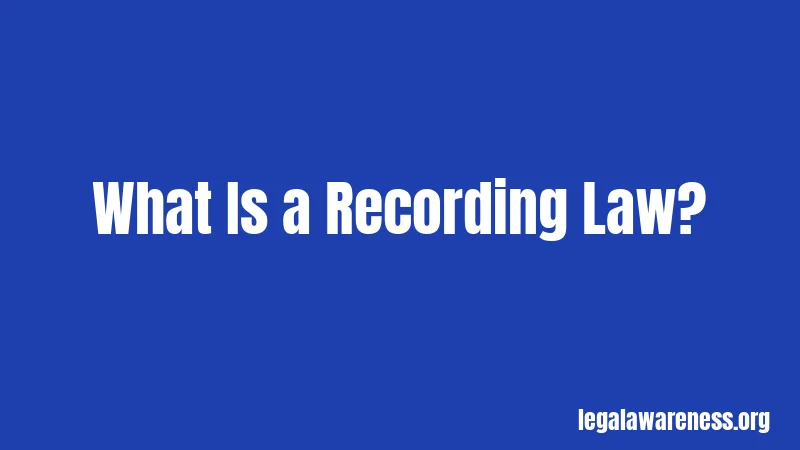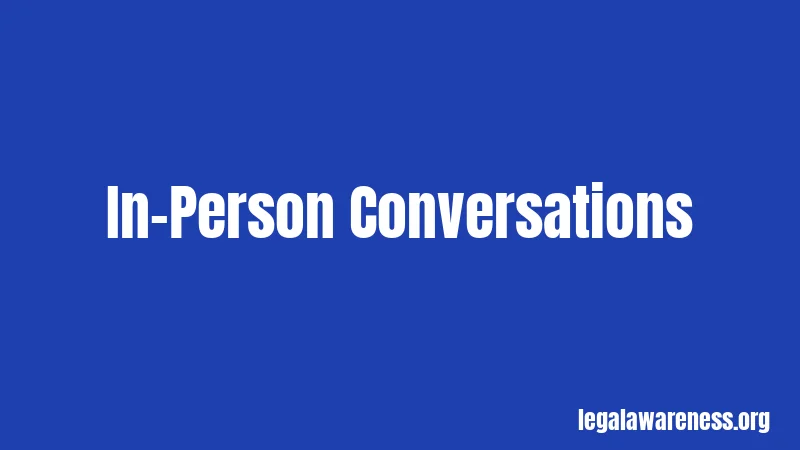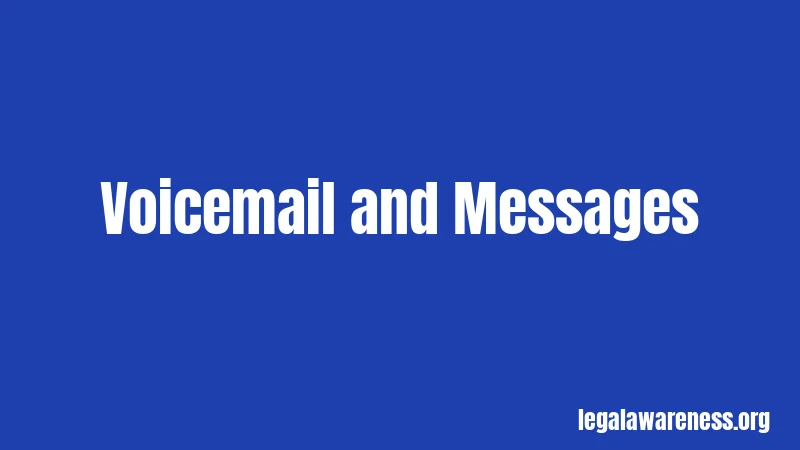Michigan Recording Laws in 2026: What You Actually Need to Know
Here’s something most people get wrong: you can’t just hit record on your phone whenever you want. Seriously. In Michigan, recording someone without their permission can actually land you in legal trouble. The penalties can be surprisingly harsh too. Let’s break down exactly what the law says and what you need to do to stay on the right side of things.
This guide covers everything from basic rules to specific situations. By the end, you’ll understand what’s legal, what’s not, and how to protect yourself.
What Is a Recording Law?

Think of Michigan’s recording law as a protection rule. It says you need everyone’s permission before you record a conversation. Not the person you’re talking to. Everyone involved. This is called “two-party consent” or “all-party consent.”
Why does this law exist? Honestly, it protects people’s privacy. Recording someone without their knowledge feels invasive. Michigan decided that everyone deserves to know when they’re being recorded. That’s the basic idea behind the whole law.
The Two-Party Consent Rule
Okay, this part is really important. Michigan is what’s called a “two-party consent” state. You’re probably wondering what that means.
It means everyone in the conversation has to agree to the recording. If you’re talking to one person, both of you need to say yes. If there are three people talking, all three need to agree. Pretty straightforward, right?
Let’s say you’re on a phone call with your boss. You want to record it for your protection. You can’t just secretly hit record. You have to tell your boss first and get their permission. Only then can you record it legally.
But wait, there’s more to know. The rule changes depending on what kind of conversation you’re recording.
In-Person Conversations

Recording someone face-to-face without their permission is illegal in Michigan. You can’t pull out your phone and secretly film someone talking. You can’t hide a recording device on your body. Both are against the law.
Here’s the thing though: if everyone knows they’re being recorded, it’s totally fine. You can film a conversation if everyone agrees to it first. The key word is “everyone.”
What if you’re recording in a public place? Does that make it legal? Not necessarily. Even in a coffee shop with people around, you still need permission from the person you’re recording. The public setting doesn’t matter. The consent does.
Think of it like taking someone’s picture without permission. Just because you’re in a public place doesn’t mean you can photograph strangers without asking. Same idea with recording.
Confused about the difference? Here’s the simple version: public place doesn’t equal public recording. You still need permission.
Phone Call Recordings
Phone calls get tricky sometimes. Michigan requires everyone on the call to know about and agree to the recording. This includes video calls, voice calls, conference calls, everything.
Many people assume they can record a call if they’re part of it. Nope. You still need to tell everyone else on the line that you’re recording. It’s not enough to say it once and forget about it. You need clear consent from each person.
What about calls for business or work? Still the same rule. No exceptions for business calls or professional reasons. Everyone has to agree.
Here’s where it gets interesting. If you record a call without permission, you’ve broken the law. The person you recorded can sue you. They might also report you to police. Either way, you’re looking at trouble.
Voicemail and Messages

Hold on, this part surprises most people. Recording a voicemail? That’s typically okay. You’re recording something that was left for you. The person knew they were leaving a message.
Text messages are already saved and recorded. You don’t need permission to keep them. The person who sent them knows messages get saved and shared. That’s different from secretly recording a live conversation.
But here’s the thing: if you record a voicemail and then share it without the person’s permission, that gets complicated. Some experts say you need consent to share it publicly. Privacy laws might apply.
Wait, it gets better. What if you record your own calls? Can you secretly record someone calling you? Nope. Even on your own phone, you need their permission to record them.
Recording for Your Own Protection
I hear this one all the time: “But I’m just recording to protect myself.” That’s a common reason people want to record conversations. Understandable. But it doesn’t change the law.
You can’t secretly record someone even if you think you might need protection. You have to tell them first. Get their permission. Then record.
Here’s the practical version: tell the person you’re recording. Say it clearly. “I’m recording this conversation for my records.” Wait for them to agree. Then hit record.
If they refuse to let you record, you have a choice. Don’t record the conversation. Or end the conversation. You can’t record them without permission, even for self-protection.
Honestly, this is the part most people get wrong. They think their intention makes it legal. It doesn’t. Consent is what makes it legal.
Recording Your Own Kids
Parents sometimes wonder about this. Can you record your kids without permission? The answer depends on their age and the situation.
Young children can’t really refuse consent. A parent can probably record a young child. But here’s the question: why are you recording them secretly? If there’s nothing to hide, you could tell them you’re recording.
Older kids and teenagers are different. They have more privacy rights. Recording a teenager secretly in their room or private space gets legally risky. You might face privacy violation charges.
The safest approach? Tell your kids you’re recording, especially if they’re old enough to understand. This keeps you legally safe and maintains trust.
Workplace Recordings
Your workplace has its own rules. Michigan allows some workplace recording without consent. Your employer can sometimes monitor you at work legally.
But here’s where it gets tricky: your boss can’t record private conversations without warning. If you’re having a personal talk in a break room, your boss can’t secretly record you.
Recording a coworker without their permission in a workplace conversation is still illegal. Just because you’re at work doesn’t give you the right to secretly record someone. The two-party consent rule still applies between employees.
Want to record something at work? Tell the other people involved first. Get their permission. Then go ahead. It’s that simple.
Police and Law Enforcement
Can you record police officers? Absolutely. It’s your right to record police in public. They can’t stop you from recording them on the street.
But here’s the nuance: you still can’t secretly record their conversations if you’re part of them. If a cop is talking to you and you’re secretly recording, that breaks Michigan law.
The safe way? Tell the officer you’re recording. “Officer, I’m going to record this interaction.” In most cases, they’ll have to accept it. Your recording of a public police encounter is protected.
This one’s important though. Document that interaction clearly. State the date, time, and location. Keep that recording safe.
Consent Requirements
Okay, so you need consent. What exactly counts as real consent? You can’t be sneaky about it. The person can’t be tricked. They have to knowingly agree to be recorded.
Here’s what works: directly telling someone you’re recording. “I’d like to record this conversation. Is that okay?” Wait for them to say yes. That’s consent.
Does consent have to be written? Nope. Verbal consent works fine in Michigan. Though honestly, written is safer. Text messages count. Emails count. Anything that shows they agreed.
What if someone says no? Then you can’t record them. Simple as that. If they don’t want to be recorded, respect that choice. Recording them anyway is illegal.
Penalties and Consequences
Here’s where things get serious. Breaking Michigan’s recording law isn’t a minor thing.
First-time violation? You could face a fine up to $500. Not huge, but it stings. More importantly, you’ve broken the law.
Second violation and beyond? Fines can jump to $1,000 or more. You might face up to 90 days in jail. This is actually a criminal offense, not just a civil problem.
But wait, there’s more. The person you recorded can sue you for damages. They can claim emotional distress, privacy invasion, all kinds of things. These civil lawsuits can cost way more than the criminal fine.
Think of it like a traffic ticket, but more serious. A speeding ticket is civil. Recording someone illegally is criminal. Different level of consequences entirely.
Some people have faced tens of thousands of dollars in civil settlements for illegal recordings. It happens. This isn’t theoretical stuff.
Special Circumstances
Recording in business meetings gets special attention in Michigan. If you’re in a meeting with multiple people, you need everyone’s permission. Even if your employer told you to record, the other attendees still need to consent.
What about recording in public events? If you’re at a concert or performance, you generally can’t record the performance without permission. Copyright issues apply too. You might break recording laws AND copyright laws.
Recording in healthcare settings? HIPAA privacy laws apply on top of Michigan recording laws. Double protection for patients. Extra legal problems for violators.
Legal advice: if you’re in an unusual situation, check with a lawyer first. Don’t guess. The penalties aren’t worth getting it wrong.
How to Record Legally in Michigan
Personally, I think this is the part most people miss. Here’s how to do it right.
First, tell everyone involved that you want to record. Be direct. “I’d like to record this conversation. Is that okay?” Clear and simple.
Wait for them to agree. Don’t record anything until they say yes. Verbal agreement works. But honestly, getting it in writing is smarter. Text them: “Just confirming you’re okay with me recording this call?”
Before you hit record, remind them one more time. “Okay, I’m starting the recording now.” This creates a clear timestamp on the recording showing everyone knew they were being recorded.
Start recording. Keep the whole conversation. Don’t edit it later to make it look different.
Store it safely. Don’t share it with random people. If someone asks for it, think about whether they have the right to it.
Stay with me here. These steps take maybe 30 seconds. But they keep you completely legal.
Recording Your Calls for Documentation
You want to record a call to protect yourself. Smart thinking. Here’s the safe way to do it.
Before the call starts, tell the person what you’re doing. “I’m going to record this call for my records, okay?” Most people won’t care. Some will. If they refuse, decide if you still want to have the conversation unrecorded.
Use your phone’s recording app or a service like Google Voice. Many phone services have built-in recording. But first, make sure everyone knows it’s happening.
After the call, keep that recording. Mark it with the date and names of people involved. Store it securely. If you need it later for proof, you’ll have it.
This approach protects you legally. It also protects the other person. Everyone knows what’s happening.
What About Consent Apps
Some apps claim they’ll record calls legally by telling everyone automatically. Here’s the reality: these apps still require everyone to agree. They just make it easier to communicate the recording is happening.
These apps are helpful, but they don’t change Michigan law. You still need actual consent. The app just documents that you attempted to get it.
Some apps work better than others. Google Voice, for example, plays a message saying calls are being recorded. That works for consent notification.
But don’t rely on an app to do the legal work for you. You need to actually get consent from the other person.
Recent Changes and Updates
Michigan law has stayed pretty consistent on two-party consent. No major changes to the basic rules recently. The law is what it’s been for years.
That said, technology keeps creating new situations. Deepfakes, AI voice recordings, synthetic audio. These newer issues don’t have clear law around them yet.
For now, follow the basic rules. Tell people you’re recording. Get permission. You’ll be fine.
If you’re doing something unusual or high-tech, ask a lawyer first. Better safe than sorry.
Frequently Asked Questions
Can I record someone if I’m just a bystander? No. Even if you’re just standing nearby, you can’t secretly record someone’s conversation. You need consent from everyone in that conversation.
What if I record someone without permission by accident? Delete it immediately and don’t share it. If you do this intentionally, that’s illegal. Accidents happen, but don’t keep or share it.
Can my employer require me to record conversations? Not if it means recording other people without their consent. Your employer can’t make you break Michigan law. If customers or clients need to be recorded, they need to consent.
Is recording a public event legal? Recording the performance itself probably isn’t legal without permission. You might also violate copyright. Public doesn’t mean you can record everything.
What if someone records me without permission? Report it to police. You can also sue them for damages. Don’t record them back without consent, though. Two wrongs don’t make it legal.
Can I record a conversation about legal rights? Not without permission. The topic doesn’t matter. Recording without consent is illegal regardless of what you’re talking about.
What about recording group conversations online? Same rule. Everyone in the video call or group chat needs to know they’re being recorded. Zoom, Google Meet, Teams, doesn’t matter. Get consent.
How do I know if someone recorded me? You might notice hesitation, hear a beep, or see an indicator. Some apps show recording is happening. If you suspect recording, you can ask directly.
Final Thoughts
Now you know the basics. Michigan’s recording law is pretty clear: get permission from everyone before you record. It’s that simple.
The penalties for breaking this law are real. Criminal charges, fines, civil lawsuits. None of that is worth secretly recording someone.
The good news? Recording legally is easy. Tell people. Wait for consent. Hit record. Three steps.
If you’re ever unsure about a specific situation, ask a lawyer. Michigan has plenty of them. Getting advice upfront costs way less than dealing with legal trouble later.
Stay informed, respect people’s privacy, and when in doubt, get written consent. You’ll be good.
References
- Michigan Compiled Law Section 750.539a: https://www.legislature.mi.gov/documents/mcl/pdf/mcl-750-539a.pdf
- Michigan State Police General Information on Recording Laws: https://www.michigan.gov/sos
- American Civil Liberties Union (ACLU) Michigan Recording Guide: https://www.aclu.org/issues/free-speech/privacy-concerns-recording
- Michigan Bar Association Legal Information: https://www.michbar.org/
- Justia Michigan Recording Laws: https://justia.com/guides/recording-laws/michigan/
